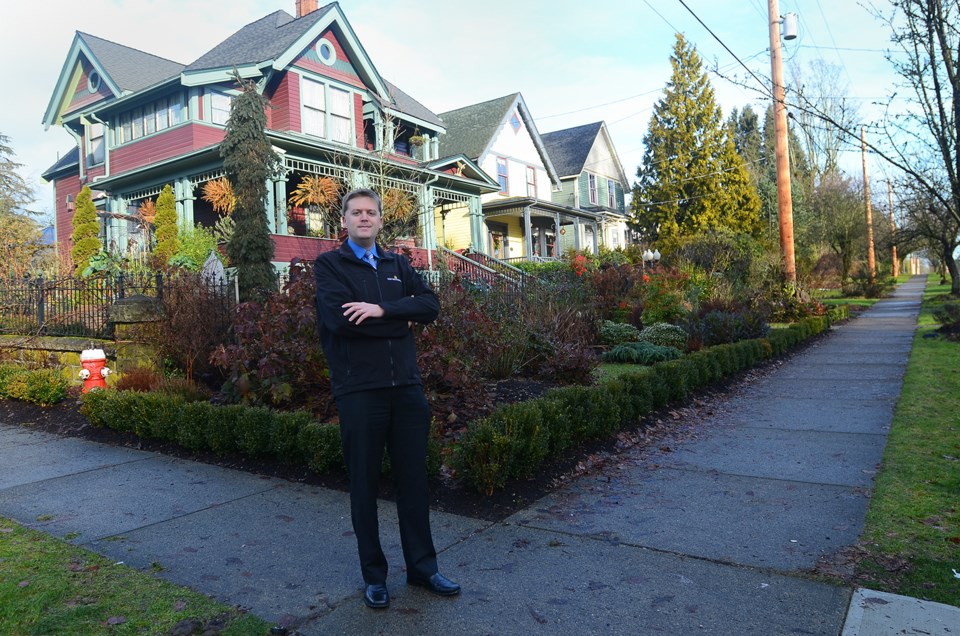Soaring property assessments may not necessarily mean huge tax hikes for Royal City residents, says Mayor Jonathan Cote.
B.C. Assessment reports that increases of 15 to 25 per cent will be typical for single-family homes in New Westminster, Burnaby, the Tri-Cities, Vancouver, North Vancouver, West Vancouver and Squamish. It recently mailed out property assessment notices showing “significant” increases in Greater Vancouver in 2016.
“What we are seeing in our assessments is definitely reflective of that hot real estate market that we are facing,” Cote said. “I think the first concern a lot of residents have is, how is this going to affect my property taxes given that the assessments are used to determine the property taxes?”
Cote said it’s important to recognize the city adjusts its mill rate downward in situations where there are significant increases like this year.
“Even if your assessment went up, say 20 per cent, if the average in New West went up 20 per cent then you are not actually going to see any impact because of the assessment. The city does downgrade the mill rate to reflect the average increase,” he said. “Having said that, I think there will be some homes that their increases are well above the average in New West and certainly there will be an impact on those individuals’ property taxes.”
According to the city’s finance department, the average increase in residential properties in New Westminster from 2015 to 2016 was 11.69 per cent. Within the residential class, assessments on single- family dwellings have increased an average of 16.54 per cent and residential strata units have increased by 3.06 per cent.
“It’s all based on what’s happening out in the real estate market,” Cote said. “All of the real estate market in New West has been hot, but the single-family market has been significantly hotter and we have seen significant price increases.”
The City of New Westminster’s website offers a tax estimator that provides a forecast about the effect of the 2015 assessments on the 2016 tax notice. (You’ll find it at http://taxestimate.new
westcity.ca.)
Cote said B.C. Assessment provides a mechanism for property owners to appeal their assessment – something he did several years ago when living in a small single-family home in the Queen’s Park neighbourhood. At that time, his assessment went up by 35 per cent, when the rest of the neighbourhood’s increased by about five per cent.
“It was a really easy, straightforward process. You don’t need to hire anyone to assist you in that process. You do need to do a bit of research as to why you are making the arguments but it’s a process that’s open to anyone to go through,” he said. “If anyone feels that there has been an error made and that the assessment doesn’t reflect what’s actually happening with the property values, I would encourage anyone to have a look at that process.”
B.C. Assessment has provided examples of some of the increases that homes in New Westminster are facing in 2016: a 1910s single-family home in the Queen’s Park neighbourhood is increasing to $1,209,000 from $1,076,000 (12 per cent); a 1960s single-family home in Sapperton is increasing to $909,000 from $776, 000 (17 per cent); a 1992 strata highrise in Sapperton is increasing to $436,000 from $415,000 (five per cent); and a 1993 strata lowrise in the Brow of the Hill neighbourhood is increasing to $335,000 from $301,000 (11 per cent). The assessment notices reflect market value as of July 1, 2015.
In response to the assessments, the province has increased the threshold for the homeowner grant for this year. British Columbians who own homes valued at up to $1.2 million may be eligible to receive a full homeowner grant, while a partial grant may be available if the house is valued above this amount.
Jason Grant, an assessor with B.C. Assessment, said property owners who feel their assessment doesn’t reflect market value as of July 1, 2015 or see incorrect information on their notice, should contact B.C. Assessment as soon as possible in January. If property owners is still concerned about their assessment after speaking to appraisers, they may submit a Notice of Complaint (appeal) by Feb. 1 for an independent review by a property assessment review panel.
Cote said the increased assessments reflect the fact that New Westminster is becoming a more attractive place to live, but also highlights some challenges related to affordable housing, issues he hopes will be addressed through the city’s official community plan update and the mayor’s task force on affordable housing.
Curious about the most expensive properties in New West? B.C. Assessment offers up this list of the Top 20 assessments in New Westminster.
1. 1135 Salter St. – $2,717,000
2. 1016 Salter St. – $2,295,000
3. 122 Third Ave. – $2,080,000
4. 221 Queens Ave. – $1,991,000
5. 127 Queen Ave. – $1,890,000
6. 303 Queens Ave. – $1,852,000
7. 106 Fifth Ave. – $1,851,000
8. 329 Second St. – $1,761,000
9. 101 College Crt. – $1,745,000
10. 323 Third St. – $1,742,000
11. 239 Second St. – $1,741,000
12. 216 St. Patrick St. – $1,719,000
13. 1502 Dublin St. – $1,693,000
14. 403 St. George St. – $1,678,000
15. 317 Fifth Ave. – $1,677,000
16. 415 St. George St. – $1,669,000
17. 118 First St. – $1,651,000
18. Three-way tie – 221 Third Ave.; 219 Third Ave; and 211 Fourth St. – $1,650,000



